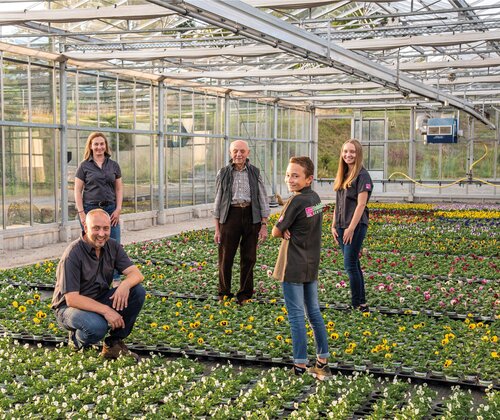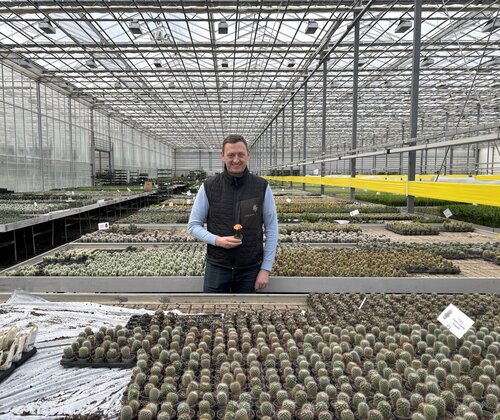
Powerful combination - plant strengthening and beneficial organisms
Many horticultural businesses and their customers are interested in preventative, plant-strengthening products, such as those from Multikraft. Frank Korting from the Rhineland-Palatinate Rural Service Centre in Germany has done some research and reports on his findings.

The Service Centre for Rural Areas offers vocational training, advice and research in viticulture and horticulture. Frank Korting works in the horticulture department and is responsible for cultivation advice and trials, among other things. Since 2014, he has also been working with Effective Microorganisms and conducting studies with Multikraft products.
The Service Centre for Rural Areas offers vocational training, advice and research in viticulture and horticulture. Frank Korting works in the horticulture department and is responsible for cultivation advice and trials, among other things. Since 2014, he has also been working with Effective Microorganisms and conducting studies with Multikraft products.
Compact plant growth with violas
The violas, known as pansies, are very popular in spring with their bright colours, especially when they grow compactly. Frank Korting carried out a trial with them and used the Multikraft system as an alternative to conventional inhibitors. One group of plants was treated with standard inhibitors. In another, two silicon products were applied with each watering and spraying process. As a third variant, one group was treated exclusively with the Multikraft system. A mixture of MK Blatt, Terrafert Blatt and fermented horsetail extract was applied regularly. Horsetail extract contains a large amount of silicon-containing silicic acid, which is important for strengthening the cell surfaces of the leaves.
What is the conclusion of this study? Frank Korting: ‘The silicon variant as an alternative to conventional inhibitors did little. The Multikraft system produced the best results as an alternative. The regular applications reduced the height and diameter of the plants. The violas treated with the Multikraft products therefore grew compactly.

How plant strengtheners and beneficial organisms get along
The use of beneficial organisms against plant pests is becoming increasingly popular in horticultural businesses, as there is a great deal of interest in saving on synthetic chemical pesticides in favour of more natural methods. Frank Korting has investigated how the use of plant strengthening agents affects beneficial organisms. To this end, test set-ups were developed for the individual beneficial organisms and the plants contained therein were sprayed with Multikraft spray solutions. These included MK Blatt, Terrafert Blatt, fermented garlic and chilli extract, fermented nettle and horsetail extract, and one spray solution also contained whey powder.
The predatory mites did not mind being sprayed at all. Only drinking the spray solution directly caused problems. However, the percentage dieback rates were so marginal that this was not an issue when using beneficial organisms. The lacewing larvae were also sprayed directly. Frank Korting: ‘Only Chrysoperla showed a slight sensitivity to the spray solution.
Under the binoculars, it appeared as if the animals were sticky, possibly due to the whey powder. We need to take a closer look at this." What overall conclusion can be drawn from the experiments? "The coating applied to the plants by the spray solution has no adverse effects on beneficial insects at all. If the animals are hit directly, the mortality rates are extremely low, meaning that Multikraft components are very compatible with beneficial organisms,’ says Frank Korting, who has already tested Multikraft fortifiers in previous trials with regard to fungal diseases such as mildew and botrytis.
Successful against mildew and co.
Regularly spraying plants with Multikraft plant strengtheners boosts their natural defence system, making them more resistant to diseases and pests and more robust overall.
"We have found that powdery mildew is very easy to control with regular treatment. MK Blatt and Terrafert Blatt were always included in the spray solutions as a base. The best results were achieved with solutions containing the additional components fermented horsetail and nettle extract.
With Botrytis, the results are more difficult, as factors such as humidity play a greater role. Overall, regular Multikraft plant strengthening works very well." Frank Korting also confirms the recognisable vitality of the plants: ‘The vitality is not measurable. However, if you touch several hundred plants, as I do during an assessment, you get this impression."
Regularly spraying plants with Multikraft plant strengtheners boosts their natural defence system, making them more resistant to diseases and pests and more robust overall.
"We have found that powdery mildew is very easy to control with regular treatment. MK Blatt and Terrafert Blatt were always included in the spray solutions as a base. The best results were achieved with solutions containing the additional components fermented horsetail and nettle extract.
With Botrytis, the results are more difficult, as factors such as humidity play a greater role. Overall, regular Multikraft plant strengthening works very well." Frank Korting also confirms the recognisable vitality of the plants: ‘The vitality is not measurable. However, if you touch several hundred plants, as I do during an assessment, you get this impression."

Since January 2019, the Steinhilber nursery in Neustadt an der Waldnaab in Bavaria has been working consistently without pesticides. Changes in crop management, the use of beneficial organisms and the Multikraft biostimulant are crucial to success.

Kurt Kirchmayr from Pupping is a founding member of the Eferdinger Landl potato/vegetable group, which acts as a direct supplier for Billa, Spar and Hofer. They cannot afford crop failures. He has been successfully experimenting with the Multikraft system on his potato fields for two years. The 2023 season brought a harvest increase of around 4.5 tonnes per hectare - an impressive increase of around ten per cent.

MK Start is used for potting at the Lundager nursery in Denmark. The loss rate of 0 % speaks for compact, strong plants that are able to defend themselves against fungal diseases.
The Lundager nursery in Odense is one of the best addresses for small ornamental plants in Denmark. Ove and his wife Olga run the business, which is constantly growing and supplies garden centres throughout Europe with its products. Preventive plant health is particularly important in glasshouses, because otherwise the plants can hardly protect themselves against fungal infestation and other diseases.
